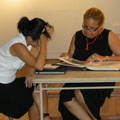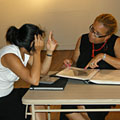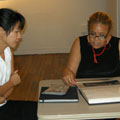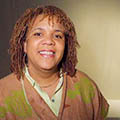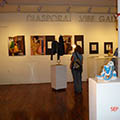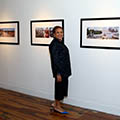History
Diaspora Vibe Cultural Arts Incubator and Diaspora Vibe Gallery
The mission of the Diaspora Vibe Cultural Arts Incubator, Inc. is to promote, nurture and cultivate the vision and diverse talent of emerging artists from the Latin and Caribbean Diaspora through the artists in residence programs, international exchanges, and community and youth activities that celebrate Miami's rich cultural and social fabric. DVCAI was founded by Rosie Gordon-Wallace, a Jamaican-American curator, collector, and businesswoman. The organization was granted its 501(c)3 nonprofit status in 2003, but has been offering programs and fulfillinf its mission since 1996 under the auspices of Diaspora Vibe Gallery, Inc. through a fiscal agent, Cultural Development Group, Inc.
The organization is based in an exhibition space, Diaspora Vibe Gallery, in Miami's Design District. Diaspora Vibe has been sought out not only by other Florida organizations, but also by regional, state, national and international organizations to bring its unique open format and cross-cultural skills to significant collaborative efforts. For example, since January 2002, Diaspora Vibe's programs, curators, and artists have collaborated in well over one hundred educational, governmental, tourism, cultural arts, business, and international exhibitions, events, presentations, exchanges, seminars, and workshops throughout South Florida and the Caribbean, as well as in New York, Paris, and Switzerland, in addition to its ongoing Caribbean Crossroads Series exhibitions and events held monthly in Miami.
Our definition of artistic vision and cultural aesthetics is expansive and inclusive, with a primary focus on the visual arts. Diaspora Vibe is particularly interested in African, Caribbean, and Latin American work that addresses and "works out" themes of the African Diaspora as well as immigration and migration between the Caribbean, Latin America, and the U.S. We value that is evocative, sincere, and well-crafted, from a variety of cultural traditions. Through exhibitions and educational programs, we contextualize and give proper attention to work that is often dismissed as educational programs, er contextualize and give proper attention to work that is often dismissed as "ethnic," "political," and "picturesque" by those not familiar with its context and the sophisticated cultural traditions that inform the work.
Our work is not only responsive to but was born out of the cultural and demographic changes in our community. The organization was formed in response to a community needs to murture and heighten the visibility of African-American, Caribbean, and Latino emerging artists, as well as to develop culturally diverse audiences and collectors to support the work. DVCAI is known for its focus on Caribbean artists, but expands to include the many cultural hybrids and manifestations of Caribbean and Latin American culture - English, Spanish, and French-speaking. This is both rare and necessary in Miami, where diasporal communities are often extremely polarized and segregated by language, race, class, ethnicity, and even the period in which they immigrated. There is often much tension between these communities. DVCAI creates a space where artists, educators, collectors, audiences, and others of diverse cultural backgrounds can interact and learn through the commonalities of Diaspora and immigrant experience.
We reflect on our work in part through our yearly International Cultural Arts Exchange Series between Miami and the Caribbean, with partner sites including Aruba, Barbados, Grenada, Jamaica, St. Martin, and the Bahamas. During these programs, we hold exhibitions, events, workshops, and seminars with participation from Miami-based and Caribbean artists, students, curators, and educators. This encourages a meaningful exchange of ideas, skills, resources, and information and gives us an enhanced perspective on our work at home.
On the last Friday of the months May through October, Diaspora Vibe Gallery hosts an exhibition featuring an artist of the month, an intimate celebration of culture and community. (Content provided by Rosie Gordon-Wallace 2008)
